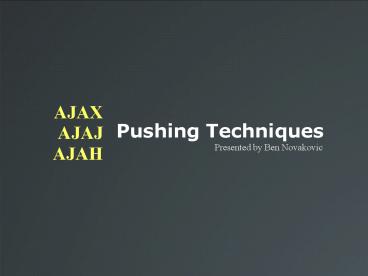P1246211300aeSWw - PowerPoint PPT Presentation
1 / 20
Title:
P1246211300aeSWw
Description:
AJAX refers to a set of techniques commonly used to make web applications more ... Meebo and Facebook use this method. Advantages/Disadvantages of Long-Polling ... – PowerPoint PPT presentation
Number of Views:53
Avg rating:3.0/5.0
Title: P1246211300aeSWw
1
AJAX AJAJ AJAH
Pushing Techniques
Presented by Ben Novakovic
2
What is AJAX?
- Who really knows?
- AJAX refers to a set of techniques commonly used
to make web applications more interactive - Additional data fetched on the fly
- How?
3
How AJAX works
- A XMLHTTPRequest Javascript Object is used
- Specify URL, key/val params and method
- Getting the retrived data?
var xmlhttp new XMLHttpRequest() xmlhttp.open('
GET', 'rpc.php', true) xmlhttp.send(null)
4
Fetched AJAX Data
- The use of the onReadyStateChange attribute is
used as a callback once the request is finished - The callback is a function specified elsewhere
that is executed.
var xmlhttp new XMLHttpRequest() xmlhttp.onread
ystatechange callbackHandler xmlhttp.open('GET'
, 'rpc.php', true) xmlhttp.send(null)
5
So why use AJAX?
- To increase interactivity with normally static
websites. - Keep the user informed with small pieces of data
rather than heavy page reloads - Because its not flash!
6
Case Study
- An in-browser chat application
- Challenges
- Unpredictable responses
- Scaleability
- Keeping the UI interactive
7
Methods of AJAX data interchange
- Three common methods, 1 not so common method
- Common
- Polling
- Long-polling (buzzword comet)?
- Not so common
- Pushing
8
Method 1 Polling
- Polling is the most common method
- Client asks server for updates at a predetermined
interval.
9
Advantages/Disadvantages of Polling
- Easy to implement
- Suits some scenarios
- Requires client to ask for updates
- Polls may fall outside of HTTP Keep-alive window
- Slow!
10
(No Transcript)
11
Method 2 Long-Polling
- Eh? Isn't this the same?
- Less common than traditional polling, but
becoming more popular - Client asks server for and update, when the
server has data to send, it will 'push' it down
to the client - Meebo and Facebook use this method
12
Advantages/Disadvantages of Long-Polling
- Client gets updated when it needs to be
- utilization of HTTP Keep-alive window
- Fast!
- if implemented incorrectly, can suffer from
'twitter' syndrome - trickier to maintain server state.
- potential to lose data between requests
13
(No Transcript)
14
Method 3 Pushing
- Sounds very much like long-polling, but isn't
- Least common of the lot due to browser woes
- Client asks server to be updated using
'multipart' HTTP header, server sees header and
keeps connection open, even after updates are sent
15
Advantages/Disadvantages of Pushing
- Client gets updated when it needs to be
- can reuse connection
- less chance of data loss
- Very Fast!
- very tricky to implement
- only Mozilla browsers support it
- hard to scale
- impossible to know when connection dies
16
(No Transcript)
17
Advantages/Disadvantages of Pushing
- Client gets updated when it needs to be
- can reuse connection
- less chance of data loss
- Very Fast!
- very tricky to implement
- only Mozilla browsers support it
- hard to scale
- impossible to know when connection dies
18
Note to Ben
- Show code demo before continuing
19
So which is best?
- How long is a piece of string?
- Weigh up the requirements and scalability issues
with each before making your decision. - Costly to change between methods once dev has
started - Pushing on the roadmap for Webkit
20
Questions































